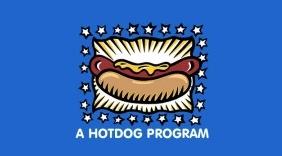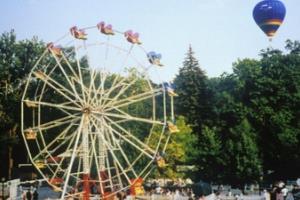Lines of people outside bookstores waiting to buy the newest Harry Potter novel and similar large clusters of customers outside an Apple Store, waiting for the chance to get the newest iPhone. They're modern symbols of fans who can't wait to own the latest hot consumer item.
Public television, which turns on a different and smaller marketing wheel, has similar excited fan participation, and Rick Sebak -- in this more select universe -- generates as much excitement among many PBS followers as J.K. Rowling or Steve Jobs ever did on the mass-market field.
The producer whose works have taken viewers through some of the country's most interesting cemeteries, for a long ride on the Lincoln Highway and to some of America's more fascinating places to eat -- among the many topics he's explored in his uniquely
"Sebak-esque" manner since the late '80s -- has two new programs coming soon for his PBS fans. "A Few Good Pie Places" and "A Few Great Bakeries" make their premieres Aug. 25 and 8 p.m. and 9 p.m., respectively (check local listings). As he did in the past for ice cream, hot dogs, unusual buildings, flea markets and amusement parks, the two new shows are a delight to watch. Only precaution: Don't watch hungry or prepare for a gigantic sweets fix during or after the viewings.
Anyone who already is a Sebak fan won't be disappointed. They're fun, educational, expertly shot-edited-narrated programs that provoke smiles and a peaceful deceleration from the way-too-intense dramas and reach-too-far sitcoms that own much of the TV schedule. Those who appreciate stand-alone television programming that created its own niche and continues to perfect it, but who haven't experienced his work, should consider this an horizon-broadening opportunity.
So much for a review. More interesting are some insights into the Sebak mind. For that fun ride, we invite you to enjoy the answers to some questions we asked of him recently. No need for seat belts or air bags. This is a fun ride for all ages.
Your topics have been varied, and I’m guessing they come from a natural curiosity about things most people wouldn’t research. If that is correct, are there more topics you have in mind? Can you share any?

I think you’re right that curiosity is a big factor. I always want a topic that I think might be interesting, fun and educational for six months to a year. I love doing the research and trying to figure out where we might go to see some good examples of our subject, whether it be bakeries or cemeteries or old wooden roller coasters. When we started this project, pizza pies were a possible topic too, and I think you could do that without being bombarded by criticism if you avoided the whole “Best” trap that so many food programs and lists now use. "A Few Good Pizza Places" could be cheesy good times. People often suggest barbecue to me as a topic, and that wouldn’t be too bad. We’re quickly approaching the 17th anniversary of my "A Hot Dog Program," and I’d love to revisit wieners as a topic, too, but I have always appreciated that PBS encourages me to not be just a food producer, so I wouldn’t mind thinking about swimming pools and swimming holes, bike trails (could be better for my health than pies and bakeries!) or Main Streets in some cool American towns. Since we did "A Ride Along the Lincoln Highway," I’ve thought that my ideal task might be doing just an endless series of shows on numbered highways. Highway programs allow you to do a mix of all topics including food, architecture, interesting distinctions, history, and the totally unexpected surprises that you sometimes stumble into.
I’ve gathered through watching that you do a lot of your research on the Web. When you started doing these programs, was the Web — I’m sure a more powerful research tool — as much help as it is today? Even if this isn’t a correct assumption, what are the most valuable tools you use when researching a project?
Who doesn’t use the Web as a research tool? We did my first national PBS programs, "An Ice Cream Show" and "Shore Things," in the pre-Internet era! (They were made in 1995 and released in 1996. And my electrical engineer brother was the only person I knew who played with the Internet then.) We relied more directly on people’s recommendations. I remember I got many suggestions from Penn State’s Ice Cream School and the members of the Ice Screamers organization. And with "Shore Things," I knew that I didn’t want to do stories about things that Chambers of Commerce might suggest, so we’d often just plan a day or two at a beach location (usually with a good ice cream shop) and go there expecting that we could talk our way into a kooky or funky beach story. That seems amazingly bold today, but we used to do such things.

I know that "A Hot Dog Program" (1999) and "Great Old Amusement Parks" (1999) were the first shows that we used search engines a lot to do research. We never would have found our story about reindeer dogs in Anchorage, Alaska, without the help of one of those old pre-Google search engines.
I still love to get personal recommendations for stories—like the two stories we did near Sacramento for these new shows—Ikeda’s in the "Pie Places" program and Mahoroba Japanese Bakery in the "Bakeries" show—they were suggestions from David Lowe, the president of WVIE, the public TV station in Sacramento. I usually double check or “verify” the stories by going online and reading other people’s reviews and such, and that seems to be a good way of “finding” and “double-checking” a story.
Our morning classical music DJ here on WQED-FM, Jim Cunningham, goes often to the Chautauqua Institution in New York in the summers, and he turned us on to Portage Pie in Westfield by bringing a pie here to the office!
So I use the Internet a lot, but I have a HUGE stack of pie books as well, and I always listen when people want to talk. I never keep my subjects a secret.
Your one pie place happened to be along the Lincoln Highway. Do you double up shooting sometimes when you are on the road for another subject?
I didn’t realize that Ikeda’s was on the old Lincoln Highway till we were there in Auburn, Calif., and I noticed the address was Lincoln Way, and there was a Lincoln Motel near by, and I thought, oh, this is the road from the Bay Area to Reno! All the pieces fit. Right away I called Brian Butko, one of the Lincoln Highway historians, and he was able to tell me several other businesses that I could see from Ikeda’s parking lot, so I knew this was truly one of the official routes of the old Lincoln Highway. Glen Ikeda was not aware of the road’s history at all, but he quickly understood it could be a promotional hook. And I like when two programs unexpectedly “touch,” so I made a point to mention it in the narration. We do double up when we’re shooting two shows at once like this, but I’m not planning another Lincoln Highway show (although I wouldn’t mind that at all).
How many hours on the road for these two newest programs? How many hours do you think/know you’ve spent on the road over the years doing your PBS specials?
Hours are too hard to calculate. We usually think in terms of days or “trips.” For instance, our New York/New England trip last September allowed us to get three stories for "Pie Places" (Portage Pies, Two Fat Cats, and Poorhouse Pies) and three stories for "Bakeries" (Columbus Baking, Orange Peel Bakery, and Standard Baking). We usually spend one day at each location. And there are six “travel days” to get us from location to location. A total of 12 days on the road. We did the Braham Pie day trip in August, another trip to Indiana for Mama Ines and the sugar cream pie stories, a long trip out west (the only time we flew) and a quick trip down South to Virginia and North Carolina. I think we budgeted 15 shooting days for each show, so a total of 30 shooting days, plus probably another 15 “travel days,” so 45 to 50 days with a crew on the road. I seldom if ever complain about that. I love my crew and we got along remarkably well.

Over the years, that’s basically been the pattern: Five trips per show, and we’ve often shot two shows at the same time to save money on travel. In 1995, we shot "An Ice Cream Show" and "Shore Things" at the same time. In 1998, we shot "A Hot Dog Program" and "Great Old Amusement Parks" at the same time. Then we did single shows for a while: "A Flea Market Documentary" in 2001, "Sandwiches That You Will Like" in 2002, "A Program about Unusual Buildings" in 2004, "A Cemetery Special" in 2005, "To Market to Market to Buy a Fat Pig" in 2007, "A Ride Along the Lincoln Highway" in 2008. Then in 2010 we shot too many stories for "Breakfast Special" and we ended up shooting just one additional story for "Breakfast Special 2" in 2011.
So over the years, if we round out some figures, calculating 25 days of shooting and traveling per show, and 13 shows. That’s a total of about 325 days.
Nearly a year of my life on the road with my crew shooting PBS specials. Good times.
Your storytelling is enhanced even more by the (in my opinion) lovingly way you edit your pieces. Do you agree that editing is important, and have your skills gotten even better over time? (I know you work with an editor or more, but as author, I think your stamp is clear on all the pieces.)
Thanks. Sometimes people want me to say which part of the process is my favorite. I like them all. I like the research and prep, I like the days on the road, and I love trying to figure out how these shows go together in the editing room. When it comes to editing, I generally put together what we call the A-roll. I listen and look again at all the footage we’ve collected. I pick the sound bites I like from the interviews, try to determine where I’ll have to add some narration, and I build the basic story. Then my editor Kevin Conrad adds the B-roll, all the pictures and illustrations of what the interviewees and I are talking about. When he finishes, we usually look at a story together and try to see where we need to work on it, where our visions might have differed and we come up with along version of the story. Then we move on to the next segment, knowing that eventually we’ll have to go back and cut down the long versions.
How would you describe the series of programs you have done for PBS — what would you say is your job description?
I would say I make programs or documentaries that celebrate often-overlooked aspects of American popular culture. And although not necessarily by design, I think they are also programs that celebrate small family-owned businesses and their histories. I like to tell stories about things that make places different and distinctive.
I’d describe my job as “TV producer making celebratory documentaries.” And I try really hard to let the people in my documentaries tell as much of their stories as possible without meddling from me.
Do you see retirement in sight, or is this a labor of love you want to keep up as long as possible?
Let’s say retirement is still (I hope) about a decade away. And if I can go on beyond that, I know I’ll be willing. I love what I get to do, and I know I’m lucky that people seem to like the programs enough to keep supporting them.